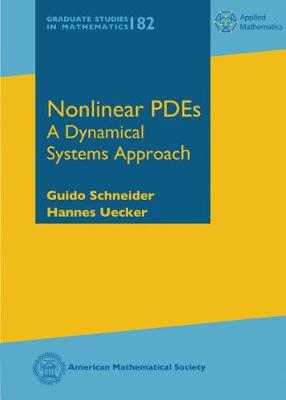Graduate Studies in Mathematics
1 total work
This is an introductory textbook about nonlinear dynamics of PDEs, with a focus on problems over unbounded domains and modulation equations. The presentation is example-oriented, and new mathematical tools are developed step by step, giving insight into some important classes of nonlinear PDEs and nonlinear dynamics phenomena which may occur in PDEs.
The book consists of four parts. Parts I and II are introductions to finite- and infinite-dimensional dynamics defined by ODEs and by PDEs over bounded domains, respectively, including the basics of bifurcation and attractor theory. Part III introduces PDEs on the real line, including the Korteweg-de Vries equation, the Nonlinear Schrodinger equation and the Ginzburg-Landau equation. These examples often occur as simplest possible models, namely as amplitude or modulation equations, for some real world phenomena such as nonlinear waves and pattern formation. Part IV explores in more detail the connections between such complicated physical systems and the reduced models. For many models, a mathematically rigorous justification by approximation results is given.
The parts of the book are kept as self-contained as possible. The book is suitable for self-study, and there are various possibilities to build one- or two-semester courses from the book.
The book consists of four parts. Parts I and II are introductions to finite- and infinite-dimensional dynamics defined by ODEs and by PDEs over bounded domains, respectively, including the basics of bifurcation and attractor theory. Part III introduces PDEs on the real line, including the Korteweg-de Vries equation, the Nonlinear Schrodinger equation and the Ginzburg-Landau equation. These examples often occur as simplest possible models, namely as amplitude or modulation equations, for some real world phenomena such as nonlinear waves and pattern formation. Part IV explores in more detail the connections between such complicated physical systems and the reduced models. For many models, a mathematically rigorous justification by approximation results is given.
The parts of the book are kept as self-contained as possible. The book is suitable for self-study, and there are various possibilities to build one- or two-semester courses from the book.
